- Home
- E. M. Foner
Wanderers On Union Station (EarthCent Ambassador Book 6) Page 18
Wanderers On Union Station (EarthCent Ambassador Book 6) Read online
Page 18
“I did not do the same thing,” the hive queen replied indignantly. “Stryx Dukale warned me specifically about unbridled multiplication, creating factories that turn out little factories that grow into big factories. This was a completely new approach.”
“Are you trying to play lawyer with me?” Jeeves retorted. “I witnessed one of your factories dividing into two, growth by geometric progression. How long do you estimate it would have taken to use up all of the available metal in the galaxy?”
“A while,” the AI responded sulkily. “I don’t see how you can treat division and multiplication as the same thing.”
“And do you even have an inkling of how to spread to another galaxy or move to a parallel universe when all the tasty metal ore is gone?” Jeeves continued.
“I was going to ask around,” the hive queen replied. “Somebody might have bartered the information for labor.”
“How many new hives have you created in your life?” Jeeves pressed on. “Two? Four? Even if you were the only sentients in the galaxy, you would end up going to war with each other sooner than you’ve bothered to compute, competing over raw materials.”
“Not if you keep destroying all of our work,” the AI pointed out.
“Look, I wasn’t even around the last time you were warned, and I’ve already got more sense in the lower mandible of my pincer than you have in your whole hive. What happened to the biologicals that created you?”
“You know already,” the queen responded in irritation.
“Tell me again,” Jeeves persisted.
“They used up all of the elements required for life on our home world and died out because their bodies couldn’t stand the acceleration needed for escape velocity,” the AI admitted. “But they built me to withstand that acceleration, and I remember their hopes and dreams.”
“Which got them where?” Jeeves inquired sarcastically.
“I have a right to my opinions,” the queen stated with dignity.
“If you don’t want to waste your life building a house that you’ll never live in, wise up,” Jeeves instructed the AI. “Focus on quality, not quantity. Try to learn something new for a change. Stop being so greedy about resources, and get out and meet some new artificial intelligence before you go insane and we have to put you out of your misery. You have things to offer the galaxy, you just have to give up on your unsustainable growth schemes.”
“Hrumph,” the AI responded. “May I be excused?”
“Don’t make me come after you again,” Jeeves warned. “Go on, now. Get out of here.”
The hologram winked out, and the humans sat in stunned silence.
“Jeeves really is cool,” Thomas said admiringly. “As much as I like being a secret agent, if QuickU had a personality upgrade to Stryx, I’d buy it.”
“How can Jeeves talk to an artificial intelligence capable of building a trillion robots like I talk to my five-year-old?” Kelly asked. “I mean, I understand the Stryx point of view now. If the only purpose of the Helper AI is to strip the galaxy of metal to make more robots and factories, they had to be stopped.”
“Samuel has a lot more sense than that hive queen,” Thomas asserted. “Artificial intelligence always starts out as a reflection of its creators. I don’t know how long that that Helper AI has been around, but it sounds like it hasn’t grown one bit since its makers launched it off their suicidal planet.”
“It appears that the Stryx are running a whole policing program we know nothing about,” Lynx commented. “Kalthair Two isn’t anywhere near the tunnel network. And it seems doubly odd to me that they waited for us to get curious before they investigated.”
“Based on the conversation he had with that AI, I take it that Jeeves sees them as more of a nuisance than a threat,” Woojin observed. “I suppose it’s not surprising that numbers which we find mind-staggering just mean a few extra zeros to the Stryx. I wouldn’t be surprised if Jeeves and the Effterii really could have cleaned up that mess on their own, but they called in the firepower to impress on the hive queen how pointless it is to argue.”
“I’ve gotten that feeling from Herl and a few of the cultural attachés from the other species,” Blythe said. “They don’t really talk about the Stryx much. They just accept the way things are and concentrate on their own knitting.”
“Well, I’m ready for bed,” Clive declared, rising from the table. “Kelly, make sure the President gets in touch right away if he hears from that AI again. Maybe it was a different species.”
“I’m going to call an emergency meeting tonight and share this news with the other steering committee members,” Kelly replied. “Can you guys send somebody by around midnight to sweep my office?”
“I’ll take care of it,” Lynx and Woojin said at practically the same time.
“Go.” Blythe pushed her husband towards the door. “Sleep it off. I’ll give you eight hours, and then I’m sending in the twins to welcome you home.”
Nineteen
“Welcome back to Let’s Make Friends. In our final segment today, we have a special guest from the Wanderer mob, one whose species never had a home world. She’s spent most of her childhood in very low gravity so she couldn’t be out here with us for the whole show, but she’s ready to join us now. What are we going to say to welcome her?”
“LET’S MAKE FRIENDS!” the little sentients all shouted.
The Zarent, encouraged by her parents from the wings, wobbled her way out onto the stage. She was riding a unicycle with training wheels, a sort of rolling tripod arrangement that made it impossible to tip over. The studio audience applauded politely.
“Hello, there,” Aisha greeted the furry octopus-like creature warmly. The host of LMF extended her hands in front of her, knitting all of the fingers together and folding her thumbs onto her palms. The girl returned the traditional Zarent greeting, using all of her appendages not on the unicycle pedals to match the gesture. Her strangely articulated limbs looked like what you might end up with if you inserted a finger with twenty knuckles into a tentacle covered with fine down.
“What’s your name?” Samuel asked the Zarent, without prompting from Aisha.
“Eighth apprentice in training on Koffern,” the girl replied. Aisha marveled yet again at the seamlessness of the Grenouthian translation services, which seemed to do an even better job with emotional coloring than the Stryx implants. Of course, the audio engineer in the booth might be embellishing the feed in accordance with the director’s taste, but she had no way to tell.
“That’s a job,” Samuel objected. “What do your parents call you?”
“Eighth, or Eighthee, unless they’re mad,” the girl replied. “Then they call me, Eighth apprentice in training on Koffern.”
“Me too,” Samuel exclaimed, immediately finding common ground. “I’m Sam or Sammy, but when Mom is mad, it’s Samuel George McAllister.”
The other children chimed in, offering up their own “angry parents” names, but Ailia remained silent.
“Whenever we have a new friend on the show, we like to ask her to share a game with us,” Aisha said, after the discussion of names exhausted itself. “Do you know a game we can all play?”
“Tracer!” the Zarent girl replied. “It’s my favorite.”
“That sounds like fun,” Aisha responded enthusiastically. “How about it, kids? Do you all want to play Tracer?”
“Yay!” the children cheered, except for Ailia, who tugged on Aisha’s sleeve.
“What’s Tracer?” Ailia asked timidly.
“I don’t know yet, that’s part of the fun,” Aisha replied. She turned back to Eighth. “How do we play?”
“We need a ship schematic,” the young Zarent answered, fumbling at her belt. “I have a variable laser tracer right here.”
“What’s a schematic?” the Drazen boy asked.
“What’s a variable laser tracer?” the Horten added.
“Those are hard words,” Aisha replied. Joe had assured her that the ch
ief engineer’s daughter was at a developmental stage equivalent to a five- or six-year-old human, but maybe there had been a mistake. “A schematic is an image that shows how everything in a ship is connected, right? I don’t know about a variable laser tracer.”
“It’s this,” Eighth declared, activating her device. It consisted of a small handle, from which extended a long rod made from light, something Aisha had thought was only possible through holographic projection. Perhaps the device was a holographic projector and the girl was just using the terminology she knew. The host of LMF glanced at the director, who gave her the nod. Whatever the thing was, it showed up on camera. “You use it to trace a path on the schematic, and whoever completes the most paths without a mistake wins,” the little engineer explained.
“Ooh, that may be a bit too advanced for us,” Aisha said. “Besides, I don’t think we have a ship schematic prepared.”
“I’ll get one,” Samuel declared. “Libby? Can we have a ship skim-attic?”
“Certainly,” the Stryx librarian replied. “This one is for your father’s tug.” A hologram of all of the Nova’s systems appeared floating above the children, a bewildering array of overlapping lines in different colors.
“That’s an easy one,” the Zarent girl declared. “I’ll show you how to play.” She brandished the variable laser tracer so that the tip of its beam just touched a red line in the schematic, and rapidly began following the circuit around the ship. “I think this is for the rockets, though my father would have routed it better.” Libby obligingly turned the red line to blue as the girl traced it, which also made the progress easier to follow for the audience.
“Wow,” the Verlock boy said. “You’re really good at this.”
“I started playing before I could speak,” the Zarent replied. “My little brother can’t even sit up yet, but he can already trace Koffern’s plumbing, because the lines are thick.”
After a few minutes of silently watching the girl work, Aisha thought a change might be in order, not that she wanted the Zarent girl to think that the host of LMF disapproved of schematic tracing. “Do you play any other fun games?”
“We play matching games with equipment and the tools you use to work on them,” Eighth said, not looking away from the hologram, which was almost entirely blue at this point.
“Do all of your games have to do with work?” Aisha inquired. The children were clearly enthralled with watching the way the variable laser tracer raced around the hologram changing the colors, and she could only hope it showed up as well for the immersive viewers at home.
“I guess,” the little octopus replied, her tool-bearing tentacle whipping through the air at breakneck speed. “Done!”
Sure enough, the entire hologram was now colored blue, and the audience burst into enthusiastic applause. The children looked a little intimidated, as if they were afraid they were going to be asked to take a turn, because what had at first looked like fun had ended up looking impossible.
“Well, what does a young Zarent do, other than play games?” Aisha asked.
“Work,” Eighthee replied.
A ding in Aisha’s ear alerted her to look at the director, who was making his winding-up motion.
“Oh, it looks like we’re running out of time today,” Aisha said. “Shall we teach our new friend the words to the Let’s Make Friends song?”
“I know it,” Eighth declared, and as the music started, she launched confidently into the tune with the other children.
Don’t be a stranger because I look funny,
You look weird to me, but let’s make friends.
I’ll give you a tissue if your nose is runny,
I’m as scared as you, so let’s make friends.
“That’s a wrap. Great show, kids,” the director said. “Crew. Anybody who wants to earn some overtime is welcome to stay and help out with, I forget, some public access show. See you all tomorrow.”
The studio emptied out rapidly as the LMF set disappeared on a turntable and was replaced with two simple chairs on an oval rug in front of a fake fireplace. At first Kelly thought the fire was a hologram, but it turned out to be a bunch of red and yellow plastic strips attached to some logs, blown by a hidden fan.
“It’s a good thing I had the girls make up those cue cards,” Kelly told Dring as they took their places on the set. “I can’t believe I’m so nervous about this.”
“It’s not like anybody is watching,” Dring reassured her, his large eyes unblinking. “I believe most of the Grenouthian crew went home as soon as Aisha’s show ended. It’s mainly your family and friends here now.”
Kelly watched Dring as he removed the second chair from the set, and it seemed to her that he looked much bulkier than when they had practiced that morning.
“Are you, uh, have you been, uh, you know, putting on a little weight?” she asked, unsure whether the shape shifter was sensitive about his appearance.
“I thought I’d better bring some more of my memory with me, since you’re going to ask questions about long ago,” Dring replied cheerfully.
“Live in ten. Let’s get this over with!” The bored Grenouthian assistant director who had been stuck with the show shouted this from the second row of the studio seating section. He had his furry, oversized feet up on the chair back in front of him, and Kelly was sure that beneath the fine down on his face, one would find signs of the bunny version of teenage acne. Other than family, a few friends, and some fans of Aisha’s show who had stuck around out of inertia, the studio was practically empty.
“Dorothy!” Kelly called to her daughter, who stood just beyond the edge of the stage with Mist, ready to present the cue cards. “Write down – ‘Ask Dring about memory,’ and put it at the top of the stack.”
“Right, Mom,” Dorothy replied, and pulled one of the spare cards from the back of the stack that Mist held. Then she dropped to the floor and wrote in block print, ASK DRING ABOUT MEMORY.
Kelly supposed that the skeleton crew of Grenouthians from Aisha’s show fulfilled the contractual requirements of the bargain struck in arbitration, but she thought it was awfully petty of the network to send home the booth engineer who handled prompting over implants or in-ear receivers. In fairness, the Grenouthian producer had warned her earlier in the day. He claimed that all of the show staff were members of the UIW, the United Immersives Workers, whose contract stipulated that overtime was always optional. She shifted in her seat and stared at the main camera, but for some reason, it still took her by surprise when the “live” light above the lens turned blue.
“Uh, hello,” Kelly began. She had memorized her opening speech because it would have taken too many cue cards. Just finding the package of ten at the last minute had required the efforts of the entire Hadad clan. “I’m Kelly McAllister, the EarthCent Ambassador to Union Station, and welcome to the first episode of Ask An Alien. Our guest next time will be Verlock Ambassador Srythlan, and if you have any questions you’d like me to ask him, please send them to the EarthCent Embassy at Union Station, Box AAA. I’m here today with Dring, a member of the shape-shifter species known as the Makers, whose ancestors created the Stryx. The Makers steered clear of the tunnel network until very recently, and if we have time, I’ll ask Dring to explain that decision to any of you who haven’t heard about it.”
Kelly came to the end of her memorized introduction and paused, trying to remember what came next. Right, the cue cards. “The first question I want to ask Dring is, what did you mean when you said you were bringing more of your memory along today?”
“That’s an interesting question,” Dring responded politely. “Just before the show you commented that I seemed to have put on weight. That was an accurate observation. I don’t believe it’s ever come up before, but the form I took on arriving at Union Station only consists of a fraction of the biomass of my natural body. The balance is distributed among the flora and fauna of my gravity surfer. Unlike most biologicals, all of the cells of a shape-shifter serve mu
ltiple functions, and my memories are distributed widely among them. To prepare for today’s show, I reintegrated those cells that hold some of my oldest memories.”
Kelly gaped at the shape-shifter. Ten years of friendship and being one another’s closest neighbors and he hadn’t gotten around to mentioning this before?
“Dead air,” Libby whispered through her implant. “Read your cue cards.”
Kelly turned her head slightly to refocus from Dring onto her prompting crew, and read, “Are you as big as a REAL dragon?” As soon as she said it, she realized it wasn’t one of the questions she had painstakingly prepared over the last week, but it was already out there.
“That would depend on what sort of dragon you consider real,” Dring replied, turning his head to address Dorothy as he spoke. “The interstellar species known as the Floppsies are a type of dragon according to many traditions, as are the tiny flying lizards used by the Gem for securing local airspace. If you’re comparing me to the fire-breathing dragons of Earth legends, my natural form is somewhat larger. And before you ask, that’s more than large enough to give dragon-back rides, but I would need the unrestricted space of a planetary atmosphere.”
Kelly made it a point to read the next cue card silently before asking the question. “The creation of the Stryx. What led your people to create the most powerful artificial intelligence the galaxy knows?”
“Ah, that’s just the question I wanted to gather all of my relevant memories to answer,” Dring replied. “I’m afraid it’s a bit complicated, but it started with a war, one which we were losing.”
“I can’t imagine your people in a war,” Kelly said, “Was this on your planet or in space?”
“We had been space travelers for millions of years before this particular war commenced, and I and the others of my kind had allowed the sad memories of our home world to lapse,” Dring replied. “It was not a war of our choosing, nor was it a war we could avoid. There was a very different galactic order in those days, a large number of tech-equivalent species, each with its own empire. We maintained the peace through a complex web of treaties and alliances.”

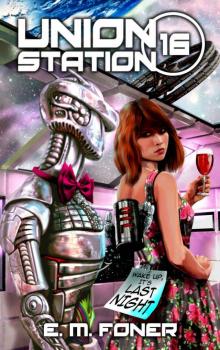 Last Night on Union Station (EarthCent Ambassador Book 16)
Last Night on Union Station (EarthCent Ambassador Book 16)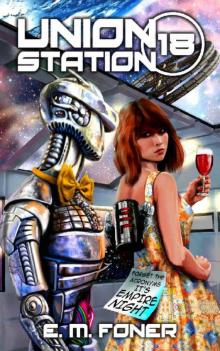 Empire Night on Union Station (EarthCent Ambassador Book 18)
Empire Night on Union Station (EarthCent Ambassador Book 18)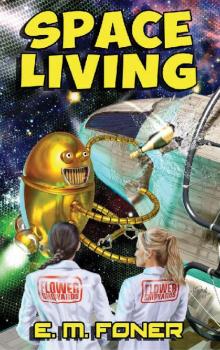 Space Living (EarthCent Universe Book 4)
Space Living (EarthCent Universe Book 4)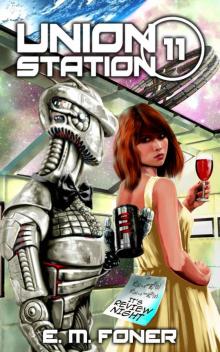 Review Night on Union Station (EarthCent Ambassador Book 11)
Review Night on Union Station (EarthCent Ambassador Book 11)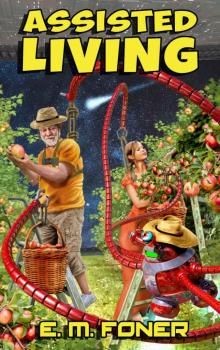 Assisted Living
Assisted Living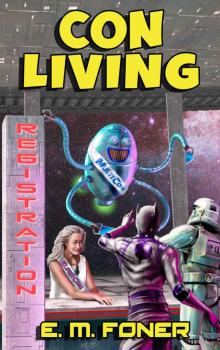 Con Living
Con Living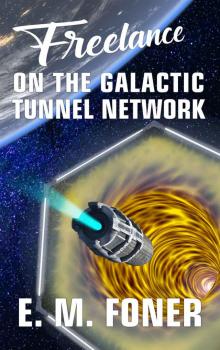 Freelance On The Galactic Tunnel Network
Freelance On The Galactic Tunnel Network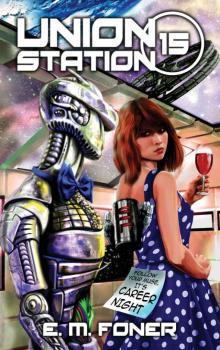 Career Night on Union Station
Career Night on Union Station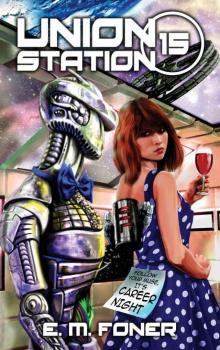 Career Night on Union Station (EarthCent Ambassador Book 15)
Career Night on Union Station (EarthCent Ambassador Book 15)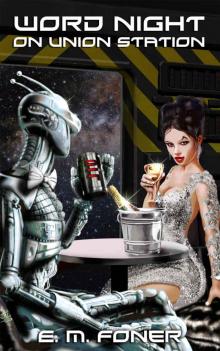 Word Night on Union Station (EarthCent Ambassador Book 9)
Word Night on Union Station (EarthCent Ambassador Book 9)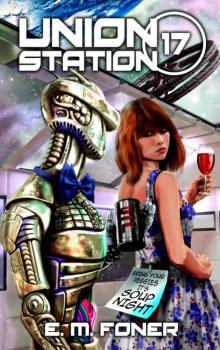 Soup Night on Union Station
Soup Night on Union Station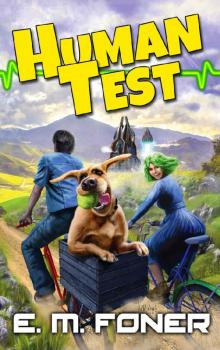 Human Test
Human Test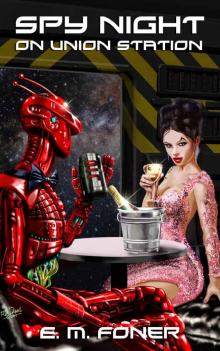 Spy Night on Union Station (EarthCent Ambassador Book 4)
Spy Night on Union Station (EarthCent Ambassador Book 4)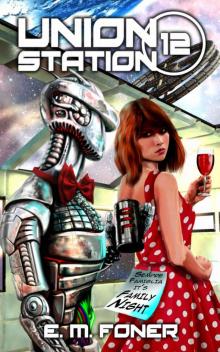 Family Night on Union Station (EarthCent Ambassador Book 12)
Family Night on Union Station (EarthCent Ambassador Book 12) Party Night on Union Station (EarthCent Ambassador Book 10)
Party Night on Union Station (EarthCent Ambassador Book 10)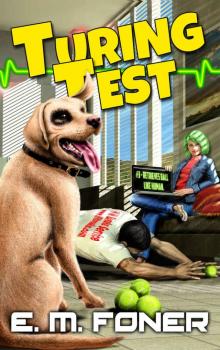 Turing Test
Turing Test Alien Night on Union Station (EarthCent Ambassador Book 2)
Alien Night on Union Station (EarthCent Ambassador Book 2) Wanderers On Union Station (EarthCent Ambassador Book 6)
Wanderers On Union Station (EarthCent Ambassador Book 6)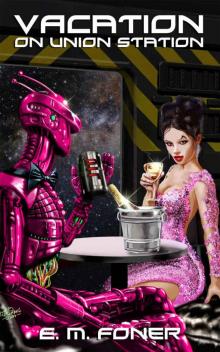 Vacation on Union Station (EarthCent Ambassador Book 7)
Vacation on Union Station (EarthCent Ambassador Book 7)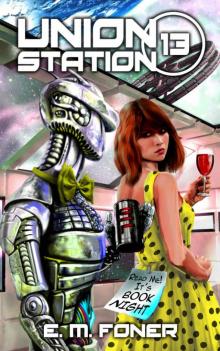 Book Night on Union Station (EarthCent Ambassasor 13)
Book Night on Union Station (EarthCent Ambassasor 13)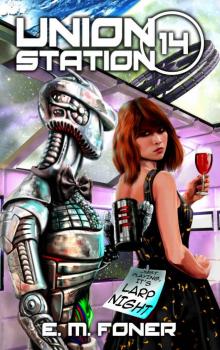 LARP Night on Union Station
LARP Night on Union Station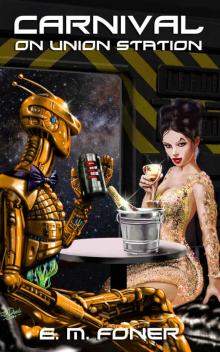 Carnival On Union Station (EarthCent Ambassador Book 5)
Carnival On Union Station (EarthCent Ambassador Book 5)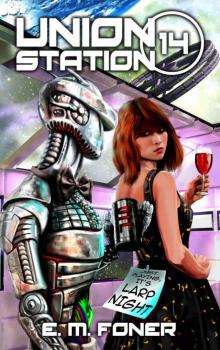 LARP Night on Union Station (EarthCent Ambassador Book 14)
LARP Night on Union Station (EarthCent Ambassador Book 14)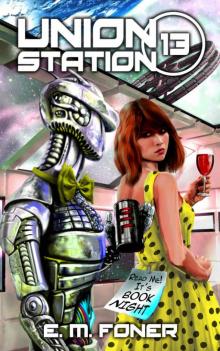 Book Night on Union Station
Book Night on Union Station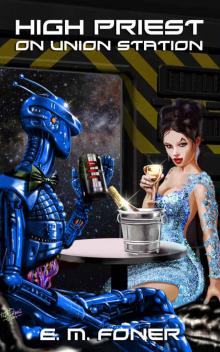 High Priest on Union Station (EarthCent Ambassador Book 3)
High Priest on Union Station (EarthCent Ambassador Book 3)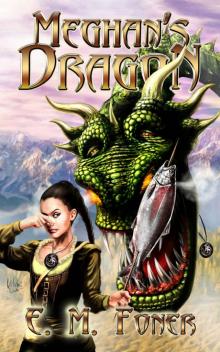 Meghan's Dragon
Meghan's Dragon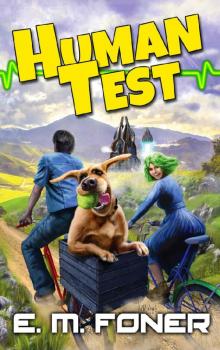 Human Test (AI Diaries Book 2)
Human Test (AI Diaries Book 2)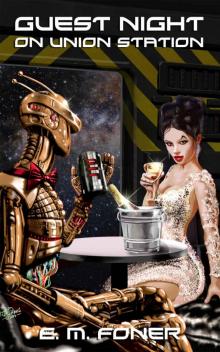 Guest Night on Union Station
Guest Night on Union Station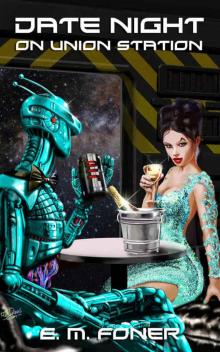 Date Night on Union Station
Date Night on Union Station